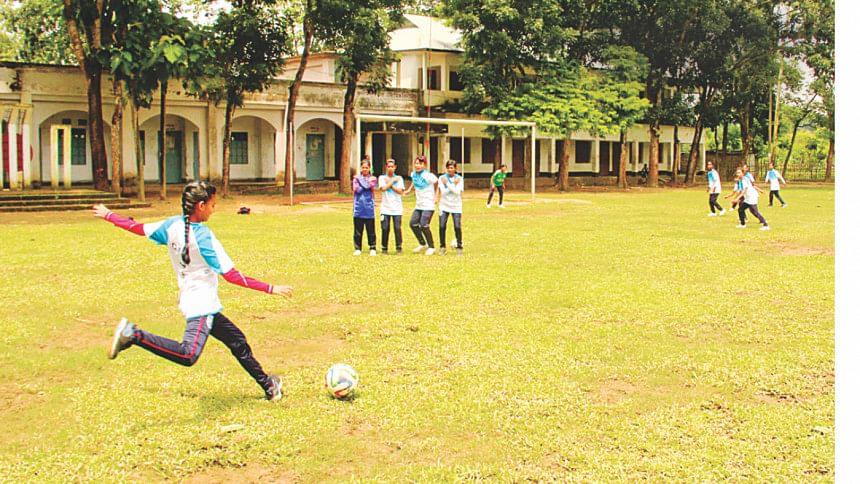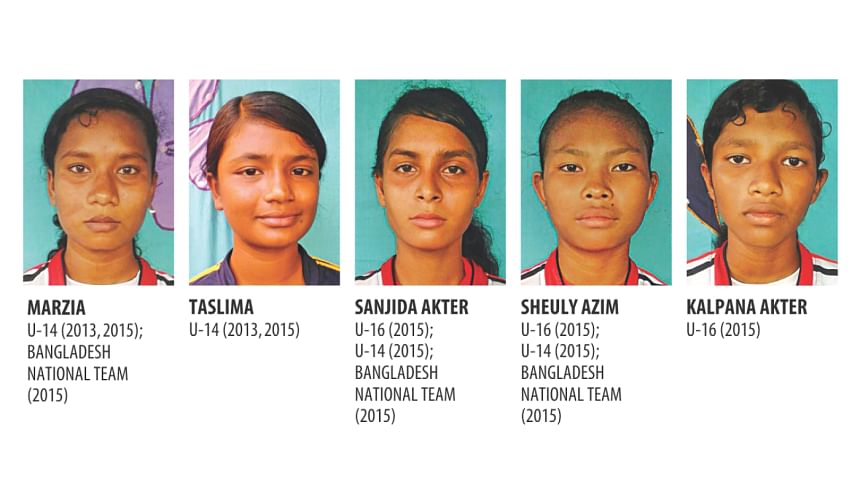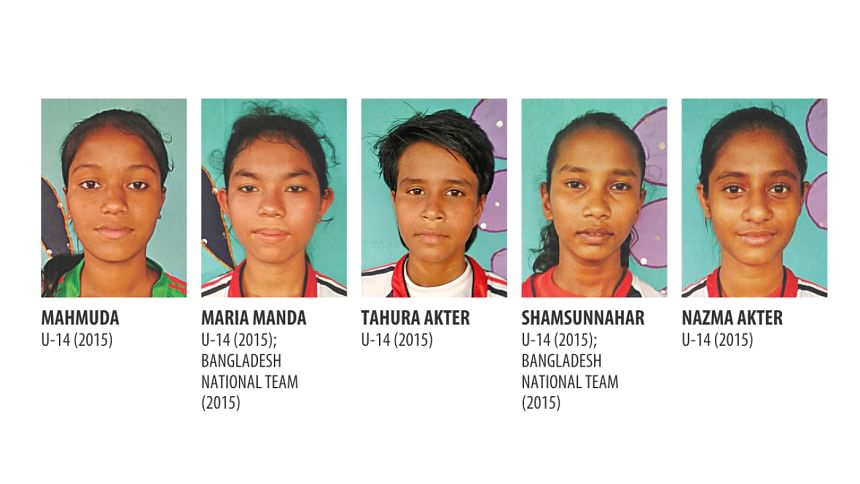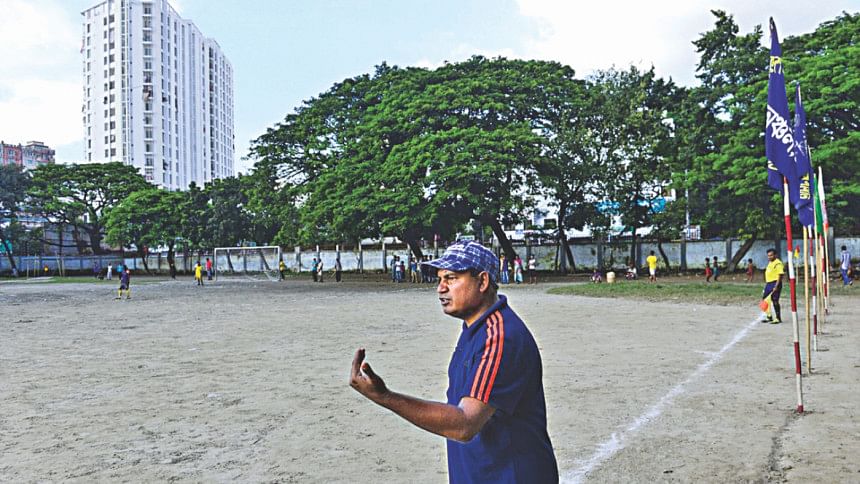The Mad Master

For a brief period, the discouraging remarks had almost compelled him to quit preparing the girls for the inaugural Bangamata Gold Cup five years ago -- a competition which his school went on to ace for two consecutive years in 2013 and 2014.
“Those few days were difficult,” Mofizuddin says with a tinge of regret in his tone. “They all just asked the same question: why will girls play football? What's in it for them?”
After coming across an advertisement of the Bangamata Gold Cup in 2011, Mofizuddin approached the school's headmistress in a bid to participate in the competition. While the school authorities readily agreed, taking part in the tournament though, as Mofizuddin later discovered, was going to be a lot harder than it initially seemed.
“We barely found girls who wanted to play. It was a rather new concept for them. I had to force certain sections to take part in the selection round.
“Once we gathered 17 players, we had to then deal with their parents. Because most of them were conservative, we had to work really hard to convince them.
“There was this one guardian who blamed me for supposedly spoiling his niece's future. 'She runs around outside all day. No one will marry her because of you,' he lamented. I told him that if she keeps improving at this rate, she can get married anywhere she wants to,” recalls Mofizuddin.
As time progressed, the practice sessions got a lot more serious. From merely kicking balls around during the lunch breaks, the girls started attending post-school training sessions. But that's when several other problems surfaced.
“The girls weren't willing to wear half pants or three-quarters. They used to play wearing salwar kameez, which made it difficult for them to run. It took them time to accept the jerseys.
“In the midst of all this, there were ridiculous comments made against us. Once when I was going to school in the morning, a couple of men pointed towards me and said, 'look there goes the master who plays with the girls.'
“There was this other time when the headmistress's son and I were watering the field after training. Two people walked by and teased us. 'Look at those mad men. So this is what the madam's son is doing after finishing his master's degree,' they taunted,” adds Mofizuddin.
Sanjida Akter, who dazzled the nation during the AFC U-16 Championship Qualifiers in Dhaka, shares a similar sentiment.
“Once we got permission from our parents and started to play we thought it would be all fine. But there were instances when our football was twice punctured by some people because the ball went over their fence,” she says.
It took some time, but the people living around the school at Dhobaura Upazila eventually did come around.
“We live in a backward region and most of the guardians either grow crops or pull rickshaws for their living. But the support that we got from them eventually was really great.

“Some of them came to practise in the evening and brought chocolates with them. One of them gave my students free rides back home. The mentality changed a lot once we started winning games,” says Mofizuddin.
And win they did. After winning the Cups in 2013 and 2014, they are now favourites of completing a hat-trick this year.
The main difference between the Kalsindur Government Primary School and the other institutions is dedication, according to Mofizuddin.
“Between 2011 and 2013, the girls trained every single day. It may sound like I am exaggerating, but that's the truth. They were so determined that they even wanted to practise during the Eid holidays.
“Once we started winning games, football became a source of inspiration for them. It turned out to be a way for them to travel outside the Upazila, something that most of them couldn't think of doing,” he says.
“It was also a way for them to delay their marriage. I have a student Taslima who studies in class nine. She trained under me in 2011. While her sister got married when in class four, Taslima still isn't married and continues to play football in high school,” Mofizuddin adds.
Today the school follows a strict six-day training schedule. As soon as class gets over, they pack their bags, wear their jerseys and sweat it out for two hours in the afternoon.
It's something that their teachers, all of whom have earned plenty of respect around the country because of them, encourage them to do.
To his credit, Mofizuddin recently completed a course with the Bangladesh Football Federation and plans to further develop his training sessions.
“I myself learnt a lot and it helps as well. Just the other day my current primary school girls team defeated the boys 2-0 and this is nothing new. The boys don't receive any training and some of the senior boys actually complain about that,” reveals Mofizuddin.

The other aspect that has helped them out is funding. They received timely financial help from various people in the region before every tournament. While the amount doesn't always necessarily cover the entire cost of the trip, it helps them tremendously.
“The good thing is that we have managed to develop a sense of liking for the game over here. In 2011, I struggled to find 17 students. Today, I have plenty of interested girls, but I don't have the means to train them all. We need more assistance.
“The students here know that if they do well, they can earn plenty of respect because they have seen their seniors earn that. For example, Sanjida Akter played under me in 2011.
“Today she plays for the national team and the chairman of the Upazila invites her father over for tea every now and then. This is something that Sanjida could not have even imagined before,” explains Mofizuddin.
If Sanjida was Bangladesh's heroine in the AFC U-16 championship in 2014, then it was Marzia, another student from the Kalsindur Primary School, who led Bangladesh Under-14 to their historic AFC U-14 championship in Nepal in December. Her strike led Bangladesh to a 1-0 victory over the hosts.
There are many other students from this school who are representing the different levels of Bangladesh's women's football teams today.
A move that was initially feared and expected to spoil the future of these girls has gone on to become a lifeline for these young footballers, for it is through this means that many of them now yearn to achieve the dreams that previously seemed light years away.

THE DREAMER
Mohammad Mofizuddin, 40, has been teaching various subjects at Kalsindur Government Primary School since 1999. An active football player back in his days, it was his dream to be able to use the beautiful game in order to help his students. That opportunity came in 2011 when he spotted an advertisement of the Bangamata Gold Cup. Today, 11 players trained by him represent Bangladesh at different levels and the astonishing fact is that Mofizuddin never received any sort of coaching classes prior to 2015. He just has one aim: “I want my girls to do what I couldn't. Represent their nation through football.”

 For all latest news, follow The Daily Star's Google News channel.
For all latest news, follow The Daily Star's Google News channel. 



Comments